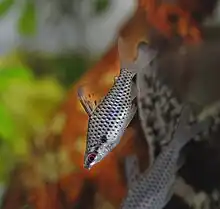Chilodontidae (fish)
The Chilodontidae, or headstanders, are a small family of freshwater characiform fishes found in northern and central South America. This family is closely related to the family Anostomidae and is sometimes treated as a subfamily, Chilodontinae, within Anostomidae. Due to issues of homonymy with two other family-rank names called "Chilodontidae", it has been proposed that the fish family retain the spelling, and the other families will be either suppressed or renamed.[1]
| Chilodontidae | |
|---|---|
 | |
| Chilodus sp. | |
| Scientific classification | |
| Domain: | Eukaryota |
| Kingdom: | Animalia |
| Phylum: | Chordata |
| Class: | Actinopterygii |
| Order: | Characiformes |
| Suborder: | Anostomoidea |
| Family: | Chilodontidae C. H. Eigenmann, 1912 |
| Genera | |
|
2, See text | |
Chilodontids have colourful markings, making them popular in aquariums. They are small fish, all less than 7 cm (2.8 in) in adult length, and are distinguished by their habitual head-down postures.[2]
Genera
This family currently contains two genera:[3]
- Genus Caenotropus (4 species)
- Genus Chilodus (4 species)
References
- ICZN Case 3555
- Weitzman, S.H. & Vari R.P. (1998). Paxton, J.R. & Eschmeyer, W.N. (eds.). Encyclopedia of Fishes. San Diego: Academic Press. p. 104. ISBN 0-12-547665-5.
- Froese, Rainer, and Daniel Pauly, eds. (2011). "Chilodontidae" in FishBase. October 2011 version.
This article is issued from Wikipedia. The text is licensed under Creative Commons - Attribution - Sharealike. Additional terms may apply for the media files.